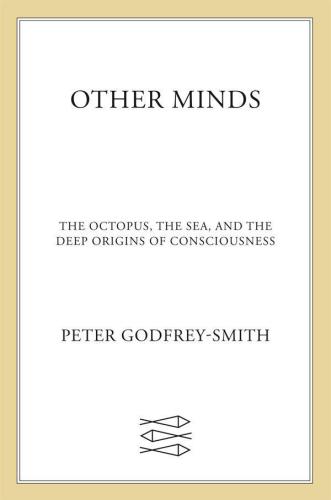
Other Minds
The Octopus, the Sea, and the Deep Origins of Consciousness
کتاب های مرتبط
- اطلاعات
- نقد و بررسی
- دیدگاه کاربران
نقد و بررسی

September 12, 2016
Deftly blending philosophy and evolutionary biology, Godfrey-Smith (Darwinian Populations and Natural Selection), an Australian philosopher of science, uses his passion for cephalopods to address “how consciousness arose from the raw materials found in living beings.” Comparing vertebrate consciousness and intelligence with that of cephalopods is not as odd as it might seem, because “cephalopods are evolution’s only experiment in big brains outside of the vertebrates.” Godfrey-Smith demonstrates that octopuses are constructed from a dramatically different plan than vertebrates, with each of their arms having the ability to act and sense their environment semi-autonomously from their central brains. This striking difference raises intriguing questions about the nature of communication within organisms, as well as about the meaning of intelligence. Godfrey-Smith couples his philosophical and scientific approach with ample and fascinating anecdotes as well as striking photography from his numerous scuba dives off the Australian coast. He makes the case that cephalopods demonstrate a type of intelligence that is largely “alien” to our understanding of the concept but is no less worthy of wonder. He also ponders how and why such intelligence developed in such short-lived creatures (they generally live only a few years). Godfrey-Smith doesn’t provide definitive answers to his questions, but the journey he leads is both thoroughly enjoyable and informative.

December 1, 2016
Philosophers don't usually practice their discipline at the bottom of the sea, but, for Godfrey-Smith, observing and videotaping octopuses in the wild have provided invaluable keys to the evolution of consciousness. In an engrossing blend of avidly described underwater adventures off the coast of Australia in what he dubbed Octopolis for its unusual congregation of busy cephalopods, and a fluid inquiry into the brain-body connection, Godfrey-Smith considers the protean nature of the octopus, a complex animal utterly divergent in its evolutionary trajectory from our own. Nonchalantly elucidating complex concepts, he describes the octopus' decentralized nervous system, phenomenally malleable body, and multihued light-show skin, all propelled by a mischievously curious and intrepid intelligence, well illustrated by lively tales about laboratory octopuses with attitude. Godfrey-Smith also performs an exceptionally revealing deep dive into the evolutionary progression from sensing to acting to remembering to the coalescence of the inner voice, thus tracking the spectrum between sentience and consciousness. Godfrey-Smith concludes with wonder The mind evolved in the sea, which is the origin of us all and concern: the sea must be defended and preserved.(Reprinted with permission of Booklist, copyright 2016, American Library Association.)

July 1, 2016
A professor of philosophy at the Graduate Center, City University of New York, and of history and the philosophy of science at the University of Sydney, Godfrey-Smith is also a crack scuba diver whose videos of battling octopuses have attracted hordes of viewers. Here he shows us how smart cephalopods, particularly octopuses, really are, how that intelligence developed, and what that means for our general understanding of life on earth.
Copyright 2016 Library Journal, LLC Used with permission.

Starred review from November 15, 2016
What happens when a scuba-diving philosopher observing an octopus realizes that the octopus is observing him? The answer is this book: Godfrey-Smith (philosophy, CUNY Graduate Ctr.; Darwinian Populations and Natural Selection) weaves his undersea experiences with octopuses and cuttlefish with scientific and philosophical analysis. Conscious awareness has evolved more than once, Godfrey-Smith explains, as he investigates these otherworldly creatures and their ways of experiencing their aquatic environment. Avoiding technical scientific data, he focuses instead on a few key evolutionary concepts explained by means of simple analogies comprehensible to the general reader. Philosophically-oriented readers will be left wanting more precise explorations of the nature of consciousness, self-consciousness, awareness, sentience, and so on. Others will wish the author had more imaginatively conceived the creature's inner life. Godfrey-Smith ultimately stops short of such speculations, remaining the outside observer, a philosopher of science, even while haunting the imagination of readers after the book's covers are closed to wonder, "What is experience like for them?" VERDICT Godfrey-Smith's forays into philosophical analysis here are immanently readable. [See Prepub Alert, 6/19/16.]--Steve Young, McHenry Cty. Coll., Crystal Lake, IL
Copyright 2016 Library Journal, LLC Used with permission.

November 15, 2016
What happens when a scuba-diving philosopher observing an octopus realizes that the octopus is observing him? The answer is this book: Godfrey-Smith (philosophy, CUNY Graduate Ctr.; Darwinian Populations and Natural Selection) weaves his undersea experiences with octopuses and cuttlefish with scientific and philosophical analysis. Conscious awareness has evolved more than once, Godfrey-Smith explains, as he investigates these otherworldly creatures and their ways of experiencing their aquatic environment. Avoiding technical scientific data, he focuses instead on a few key evolutionary concepts explained by means of simple analogies comprehensible to the general reader. Philosophically-oriented readers will be left wanting more precise explorations of the nature of consciousness, self-consciousness, awareness, sentience, and so on. Others will wish the author had more imaginatively conceived the creature's inner life. Godfrey-Smith ultimately stops short of such speculations, remaining the outside observer, a philosopher of science, even while haunting the imagination of readers after the book's covers are closed to wonder, "What is experience like for them?" VERDICT Godfrey-Smith's forays into philosophical analysis here are immanently readable. [See Prepub Alert, 6/19/16.]--Steve Young, McHenry Cty. Coll., Crystal Lake, IL
Copyright 2016 Library Journal, LLC Used with permission.

























دیدگاه کاربران